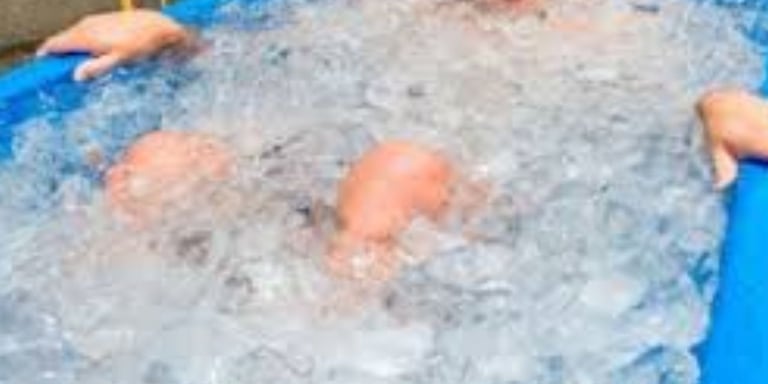
Health is a crown on the heads of the healthy that only the sick can see.

Can Cold Exposure Improve Health and Prevent Illness? ❄️🛁💪🧠
Discover the health benefits of cold water immersion for post-exercise recovery, including inflammation reduction, muscle soreness relief, and enhanced athletic performance. Learn how it can improve mood, cognitive function, and overall quality of life.
GENERAL
Dr Hassan AlWarraqi
2/1/20254 min read


Health Benefits of Cold Water Immersion
Discover the health benefits of cold water immersion for post-exercise recovery, including inflammation reduction, muscle soreness relief, and enhanced athletic performance. Learn how it can improve mood, cognitive function, and overall quality of life.
Cold water immersion, whether through cold showers, ice baths, or natural cold water dips, has gained significant popularity as a potential method to improve health and recovery after exercise.
This practice involves partial or full submersion of the body in cold water for a short period. It can be done in a bathtub, cold lakes, or specialized centers, with water temperatures at 50°F (10°C) or lower.
Sessions typically start at 30 seconds to 1 minute and gradually increase to 5-10 minutes. Researchers are still working to determine the optimal process and timing for these sessions.
Potential Benefits:
Post-Exercise Recovery: Research suggests that ice water may positively impact recovery by reducing inflammation and soreness.
Improved Athletic Performance: It may help reduce muscle damage from exercise, decreasing inflammation and soreness, and enhancing physical performance the next day.
Physiological Effects: Cold exposure can trigger responses such as reduced metabolic activity, changes in hormone production and blood flow, and immune system activation.
Other Improvements: It may aid in building endurance, restoring nervous system balance, and enhancing cognitive function and mood.
Risks and Drawbacks:
Cold Discomfort: Regular practitioners may develop greater cold tolerance, but discomfort is common initially.
Frostbite Risk: Especially when immersing in outdoor cold environments.
Hypothermia Risk: Excessive cold exposure can lead to hypothermia, so warm towels and clothing should be prepared.
Impact on Strength Training: For athletes, cold water immersion may hinder long-term strength and muscle growth by disrupting molecular signaling pathways activated post-exercise. However, it doesn’t seem to negatively affect endurance training in the same way.
Tips and Recommendations:
Consult Experts: Seek advice from a sports medicine specialist before starting cold water immersion.
Medical Check-Up: Individuals with cardiovascular risk factors should consult a doctor.
Moderation: Start with short durations and gradually increase.
Caution: Avoid immersing in flowing or frozen waters to minimize risks.
Key Quotes:
"Research suggests that ice water may have a positive effect on post-exercise recovery by reducing inflammation and soreness."
"Cold exposure can trigger responses in your body, such as reduced metabolic activity, changes in hormone production and blood flow, and immune system activation."
"For those engaged in resistance training, cold water immersion may halt molecular signaling pathways typically activated after exercise, potentially hindering long-term strength and muscle growth."
It is considered a form of "positive stress" that can reduce inflammation, contributing to longevity and improved quality of life.
Summary:
Cold water immersion is a powerful practice for enhancing physical and mental health. Gradual exposure to cold can boost vascular health, reduce inflammation, and improve mood and cognitive function.
However, it should be approached cautiously and under expert supervision, considering potential risks.
Start your cold exposure journey today and let the cold become your teacher and ally on the path to better health.
Key Takeaways:
Cold water immersion involves partial or full submersion in cold water for short periods.
Benefits include reduced inflammation, improved recovery, enhanced mood, and cognitive function.
Risks include frostbite, hypothermia, and potential negative effects on strength training.
Always consult experts and practice moderation to maximize benefits and minimize risks.
Questions and Answers :FAQS frequently asked question
What is cold water immersion, and what are its basics?
It involves submerging the body partially or fully in cold water (50°F or lower) for short periods, starting at 30 seconds to 1 minute and gradually increasing to 5-10 minutes.
What are the potential benefits for recovery and athletic performance?
It may reduce inflammation, muscle soreness, and damage, enhancing recovery and performance. It also stimulates physiological responses like immune activation and hormonal changes.
What are the risks?
Risks include cold discomfort, frostbite, hypothermia, and potential negative impacts on strength training.
Can it affect different types of training differently?
Yes, it may benefit endurance training but hinder strength and muscle growth in resistance training.
What precautions should be taken?
Consult a specialist, start gradually, and avoid extreme conditions like frozen or flowing water.
Can it be practiced daily?
Yes, but daily use post-training may hinder long-term performance improvements
How does it affect the nervous system and mood?
It may restore nervous system balance and improve cognitive function and mood through physiological responses.
What is "positive stress" in this context?
It refers to the beneficial stress from cold exposure that reduces inflammation and improves longevity and quality of life.
Keywords:
Cold water immersion, health benefits, post-exercise recovery, athletic performance, inflammation reduction, muscle soreness relief, immune system activation, mood improvement, cognitive function, nervous system balance, positive stress, hypothermia, frostbite, strength training, endurance training, expert consultation, moderation, quality of life, longevity.
🧠 Cold + Fasting = A Metabolic Power Combo?
Both fasting and cold exposure activate stress-resistance pathways such as AMPK, SIRT1, and FOXO genes—all known to support:
Cellular repair
Autophagy
Reduced oxidative damage
Longevity
Combining them (carefully and strategically) may amplify these benefits, especially in inflammatory, metabolic, or neurodegenerative conditions.
⚠️ Safety Guidelines
While cold exposure can be powerful, it should be practiced gradually and responsibly:
Start with 30–60 seconds of a cold shower
Never enter ice water alone or stay in too long (risk of hypothermia)
People with cardiovascular issues should consult a doctor
Avoid during illness, after eating, or if feeling faint
✍️ About the Author
Hassan Al-Warraqi is a holistic health educator and founder of H-K-E-M.com. His research focuses on traditional healing methods and modern lifestyle interventions—including fasting, cold therapy, and natural stress adaptation—as tools for preventative and regenerative health.
📱 Short Social Media Version
🖋️ By Hassan Al-Warraqi
Founder @h_k_e_m_com | ❄️🧠 Cold exposure isn’t crazy—it’s cellular medicine. Boost immunity, burn fat, and clear your mind. Cold is the new cure. #ColdTherapy #IceBaths #NaturalHealing





Get in touch
Address
Cairo Al Rehab
Contacts
+20 109 405 2056
hassanalwarraqi@h-k-e-m.com
